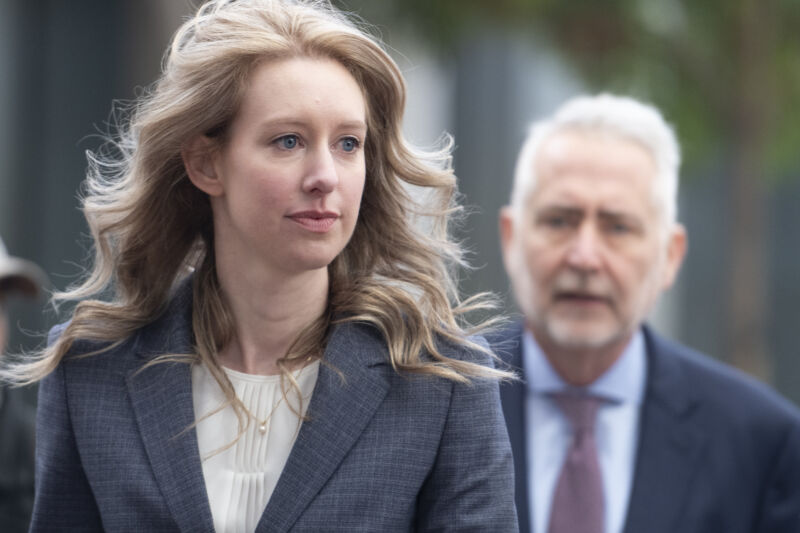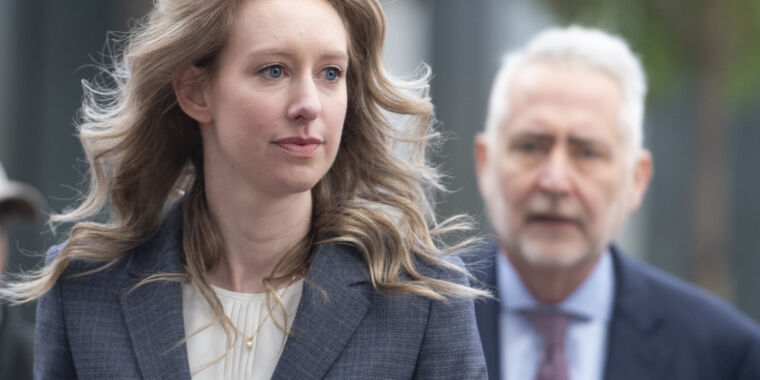
On Monday, at the criminal trial of Elizabeth Holmes, Theranos investor Alan Eisenman walked into the courtroom and held aloft an enveloped stuffed with his personal notes. He hadn’t wanted to hand them over, but the defense had subpoenaed them. Here, take them, he seemed to be saying.
It was just one of many theatrical moments Eisenman would deliver in a brief day of testimony in San Jose, California. Eisenman invested around $1.2 million in the startup only to see his money vanish when the company went belly-up in 2018. His investment is behind one of the counts of wire fraud that Holmes is facing. But as the court heard, Eisenman had plenty of opportunity to cash out.
His first chance was in 2010, when Holmes offered to pay him at least five times his initial investment to buy back his shares. In 2015, he had two more chances: Eisenman spoke with people at SharesPost, a market for trading shares in private companies, who said he could probably sell for $14.75, which would net him at least $20 million. Also in 2015, he was approached by Chris Boies, the son of Theranos attorney and board director David Boies, who offered to pay $15 per share.
Holmes defense attorney Kevin Downey, in cross-examination, asked Eisenman how much money he could have made if he had sold. Eisenman didn’t take kindly to the question. “How is that relevant?” he asked.
In redirect, assistant US attorney John Bostic asked Eisenman what his understanding was of what his shares are worth today. “It’s not an understanding, it’s a conclusion. It’s worth zero,” Eisenman said.
Yet, three years before Theranos was dissolved, Eisenman had an opportunity to cash out at around a 2,000 percent return. So why didn’t he?
Seeking information
Eisenman claimed that he couldn’t make an informed decision and that he wasn’t getting sufficient information from Holmes, COO Ramesh “Sunny” Balwani, or any other person affiliated with Theranos. Part of his animus appears to stem from the fact that, after his initial investment, Eisenman said he had several years’ worth of personal updates from Holmes herself. But then they stopped.
When Eisenman stopped receiving personal updates, he grew concerned and peppered executives and the board chairman with requests for more detail. People at Theranos didn’t take it well. In an email, Holmes claimed that he had been “harassing our chairman.” (On the witness stand Eisenman said this was a “total mischaracterization.”) Eisenman even tried to get more details from Theranos board member and former Sen. Bill Frist, who knew his father-in-law, Joel Gordon, a wealthy Tennessee political donor.
Downey pointed out that Eisenman’s contract in 2013 said that his investment was “highly speculative.” “I would agree it’s boilerplate,” Eisenman said. “Everybody signs it.” He added that it “contradicts everything I understood at this point of time” and that he felt he had no choice but to sign it.
“The company didn’t put a gun to your head and make you invest, did they?” Downey asked.
“Excuse me?” Eisenman said. “I don’t understand the question.” He eventually admitted that he thought the “highly speculative” part of the contract was meaningless.
Eisenman’s testy exchanges with the defense were a theme of the day. In another instance, Judge Edward Davila asked him if he heard Downey’s question. “I did hear it. But it’s misleading, I’m sorry,” Eisenman said.
And so it went, with Downey asking questions and Eisenman frequently talking over the defense attorney or offering his thoughts beyond the scope of the question. After striking one of the investor’s comments from the record, Davila reminded Eisenman, “The lawyers get to ask the questions, and it’s your privilege to answer them.”
In cross-examination, Downey revealed that Eisenman disobeyed a court order over the long weekend break. At the end of Wednesday’s session, Eisenman was free to return home to Texas on the condition that he not speak to anyone about the trial. But within 15 hours of leaving the court, Eisenman emailed prosecutors “some reflections” on his testimony, which got him a phone call from an FBI agent telling him to knock it off. Yet, the next day, Eisenman emailed them again (about travel arrangements, he said), which forced Bostic to call and repeat the order. The defense used those emails, juxtaposed with his entreaties to Theranos executives, to paint the investor as a guy who doesn’t know when to let things lie.
Why not sell?
Eisenman never seemed to answer the question of why he wouldn’t sell in 2015, but “greed” is a possible reason. Eisenman said that he felt his shares were worth “well in excess” of the highest offer he received. “We had no financial information to make a rational decision,” he told the court about his decision not to sell.
Still, even with the dearth of information, it’s hard to imagine anyone faulting him for cashing out when he was up over twenty-fold. But he didn’t, and as the old saying goes, “pigs get fat, hogs get slaughtered.”
